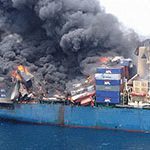
The recent fire aboard ‘Yantian Express’, details of the final judgment on the ‘MSC Flaminia’ explosion in July 2012, and the ongoing investigation of the ‘Maersk Honan’ fire are currently making headline news. Then recently news came in of ‘Grande America’ sustaining a container fire in the Bay of Biscay and subsequently sinking. These perilous incidents not only frequently cost lives, millions of dollars in cargo losses and ship damage, but also significant delays in cargo supply chains amounting to major disruption across numerous industries in these ‘just-in-time’ days.
Yet these incidents are merely the tip of a failing safety iceberg. Taking the maritime segment of global supply chain, it is estimated that a major container ship fire at sea occurs on average every 60 days, albeit that there have already been four major cargo-related fire incidents in 2019. Furthermore TT Club’s records indicate that across the intermodal spectrum as a whole, 66% of incidents related to cargo damage can be attributed to poor practice in the overall packing process; that is not just in securing but also in cargo identification, declaration, documentation and effective data transfer. The calculated cost of these claims in the Marine Aviation & Transport (MAT) insurance sector is in excess of USD 500 million a year.
All types of cargo can be mishandled, however wrongly classified, labelled, packed or simply inaccurately identified dangerous commodities bring the greatest potential risk of disaster. Estimating the degree of failure to comply with best practices in this regard is not straightforward. ICHCA International, the cargo handling operatives association has calculated that of the 60 million packed containers moved each year, 10% or six million are declared as DG. Information from published government inspections (which are invariably biased towards declared DG loads) suggests that 20% of these are poorly packed or incorrectly identified. This translates into 1.3 million potentially unstable DG containers traveling around the world each year.
Peregrine Storrs-Fox, TT Club’s Risk Management Director emphasises that this scale of risk is elevated when undeclared or misdeclared DG consignments are considered. “In these cases an estimate of volumes is more obscure. An indication has been given through the work of one container carrier, Hapag-Lloyd, developing a profiling algorithm to search its booking system for potential misdeclaration of commodities. Results from Cargo Patrol, when extrapolated to the carryings of all the lines, concludes a reasonable estimate in excess of 150,000 volatile containers in the supply chain each year.”
